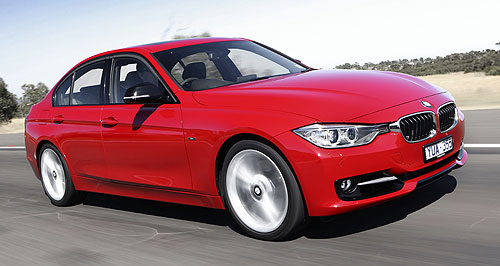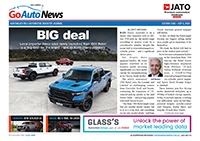Make / Model Search
New models - BMW - 3 Series - sedan rangeFirst drive: Top of the BMW ThreeArch rivals: BMW Australia expects its new 3 Series mid-sizer to wrestle back segment leadership from the Mercedes-Benz C-class. BMW hopes its sixth-generation 3 Series will regain segment leadershipGallery Click to see larger images 15 Feb 2012 BMW expects its latest 3 Series range to retake market segment leadership from the Mercedes-Benz C-class this year with a combination of freshness, value pricing, new personalisation options, more space, better dynamics and significant efficiency improvements. Out on Tuesday February 25 but released to the Australian media on Valentine’s Day, the sixth-generation Munich sports sedan stalwart will be headed by 320d, 328i and 335i sedans, with the 318d base car and volume-focussed 320i arriving in May. The as-yet-secret Touring wagon versions will not arrive in Australia until sometime in 2013, with coupe and convertible variants – along with the high-performance M3 models – expected to surface from 2014. Hybrid and even electric F30 iterations are also in the pipeline, although none have been confirmed for Australia. According to BMW Australia product manager Toni Andreevski, the new 3 Series sedan has what it takes to dominate the upper-medium class once again, after the previous E90 generation conceding leadership to the W204 C-class in 2008. Last year, the former achieved 4203 sales against the latter’s 6428 – the lowest annual tally this 3 Series model had registered, and a corollary of the BMW’s advancing age compared to the younger (2007 era) Mercedes. An extensive C-class facelift during 2011 did not help Munich’s cause either. “The prime objective is to continue the successful tradition … in combining luxury with dynamic performance in what for us is the ultimate sports sedan,” Mr Andreevski said. “We obviously want to regain our position in the market and make sure customers have a car that’s more powerful and more dynamic than before, as well as more spacious with lots of new technical innovations. “It’s only natural that you have a lifecycle effect. If you look back throughout our 3 Series sedan life cycle towards the end of the E46 (in the mid 2000s) you had Mercedes-Benz C-class overtake us for one or two years. “(Now) the new car is sufficiently refined and improved over its predecessor in areas of engine technology – we’re now turbo across the whole range … we have significantly improved customer value … we have class-leading technical innovations … the car is more spacious now, we’re giving customers the opportunity to individualise their purchases with the new ‘Lines’ concept, and overall the car is more dynamic that it has been in the past so we have a range of new abilities (to help lure more customers).” Although BMW expects the base four-cylinder petrol version of the F30 – the 320i – to be the bestseller in Australia thanks to its combination of affordability, performance and diesel-rivalling low fuel consumption, the upcoming 318d might be a dark horse due to its competitive pricing. In the latter years of the outgoing 3 Series, the 320d diesel was the dominating model, although it did trade places with the 320i “almost on a monthly basis”, according to BMW. “(But) we expect the 320i to be the volume model,” Mr Andreevski said. “And if you look at the shift from petrol to diesel and then back to petrol (over the last five years) there’s a prevalent theme (happening) … (pushed through by) the more efficient direct-injection (and in some cases turbo) petrol engines (where) you see fuel consumption come down to almost diesel levels. “Customers like the idea of a four-cylinder petrol model with good performance but with the economy of a diesel engine.” One big factor in the new 320i’s favour is its more favourable pricing as a result of reduced luxury car tax (LCT) as a result of its sub-7.0 litre per 100km average fuel consumption rating. The E90 version of the same car with options was more expensive than the diesel counterpart because it could not meet the Australian Government tax threshold. “The major difference in the past was that the 320i was above 7.0L/100km, so therefore any options you put on the car incurred the LCT. “But now the petrol 320i will join the diesel in having no price discrimination for options. So if customers are comparing both cars and adding $5000 to $10,000 of options they are not penalised for buying the petrol model where in the past they were. “But on the other hand … the new price point with the 318d could bring some new customers to the fold to balance it out.” Although BMW does not reveal volume projections, it anticipates initial diesel uptake for the remainder of 2012 to be about 40 per cent of all 3 Series sales. Of the three new personalisation packages introduced for the F30 – Sport, Modern and Luxury – BMW believes the Sport will be the most popular as it best fits the performance perception of the brand. Devised to lure buyers away from rival contenders, the Luxury line is a tilt at Mercedes-Benz and Lexus while ‘Modern’ is aimed at people who might consider a Volvo or Audi.
 Quick testsRead moreAll new models Alfa Romeo Alfa Romeo Abarth Abarth Audi Audi Aston Martin Aston Martin BMW BMW Bentley Bentley Chrysler Chrysler Chevrolet Chevrolet Dodge Dodge Citroen Citroen Ferrari Ferrari DS DS Ford Ford Fiat Fiat FPV FPV Foton Foton Haval Haval Great Wall Great Wall Honda Honda Holden Holden Hyundai Hyundai HSV HSV Isuzu Isuzu Infiniti Infiniti Jaguar Jaguar Iveco Iveco Kia Kia Jeep Jeep Land Rover Land Rover Lamborghini Lamborghini Maserati Maserati Lexus Lexus McLaren McLaren Mazda Mazda Mercedes-Benz Mercedes-Benz Mitsubishi Mitsubishi Mini Mini Opel Opel Nissan Nissan Porsche Porsche Peugeot Peugeot Ram Ram Proton Proton Rolls-Royce Rolls-Royce Renault Renault Skoda Skoda Saab Saab SsangYong SsangYong Smart Smart Suzuki Suzuki Subaru Subaru Toyota Toyota Tesla Tesla Volvo Volvo3 Series pricing
Motor industry news |
|
||||||||||||







































Facebook Twitter Instagram